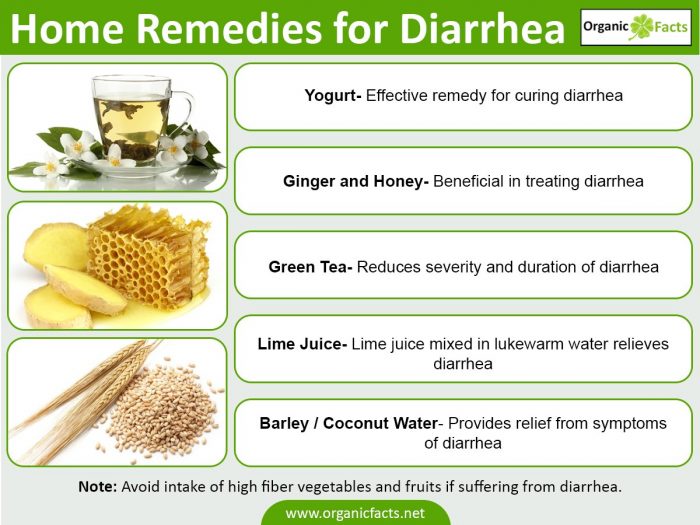Whether it lasts for few hours or few days, it doesn’t matter! Once diarrhea sets in, it is always uncomfortable and inconvenient. Had plans to attend a wedding tonight? You’re in for a disappointment, as you make repeated visits to the washroom. The condition can be annoying and is rarely serious. but you need to be aware of self- help tips to manage the condition on your own and when to seek professional medical advice.
Diarrhea is loose, watery bowel movements that occur three or more times a day. It is caused by bacteria, viruses, or parasites, and may last from anywhere from 2 days to 4 weeks. [1]
Treatments & Home Remedies for Diarrhea
Diarrhea usually resolves on its own without treatment. However, try adopting the following home remedies to help you cope with the signs and symptoms until it subsides completely.
These home remedies for diarrhea can be very effective, depending on the intensity and the cause of the condition:
BRAT Diet
The BRAT diet consists of Bananas, plain Rice, Applesauce, dry Toast, and tea, which are mild foods to soothe the stomach and recover quickly from a bout of diarrhea. It is not recommended for adults or children who are having frequent episodes of vomiting. Wait until you can have solid foods without vomiting. As the BRAT diet lacks all the elements of a healthy diet, you can’t consume it for a long period. You should be able to start eating a regular diet but modified in consistency and texture depending upon your condition within 48 hours after a diarrheal episode. [2]
Avoid eating certain foods such as fatty foods, dairy products, high fiber foods or highly seasoned foods initially as it may irritate the stomach. Gradually add semi-solid and low fiber foods as your bowel movements return to normal. For example, you could opt for a split moong dal khichdi with a bottle gourd vegetable. Opt for starchy foods such as rice, potatoes, cereal (unsweetened).
Curd/Yogurt
Probiotics can help restore a healthy balance to the intestinal tract by boosting the level of good bacteria. Pair your khichdi with a bowl of homemade curd or yogurt. And you have the most readily available remedy in your kitchen pantry.
Lime Juice
Lime juice is one of the best home remedies for diarrhea. You can drink lime juice in lukewarm water. You can also add honey for improved taste. It can be consumed 2-3 times a day for best results.
Liquids
Consume plenty of clear liquids, including water, fresh fruit juices, broths, and homemade vegetable soups. Stay away from caffeine and alcohol. [3]

You have diarrhea if you have loose stools three or more times in one day. Photo Credit: Shutterstock
Barley/Coconut Water
These are starchy liquids and are quite thick, so they help reduce the excretion of excessive fluid by having a “binding effect” on bowels. Moreover, they calm your stomach thus reduce any burning sensations. Intake of these liquids should be every 5 hours or 2-3 times a day, depending on the severity of diarrhea. Besides, coconut water is a good source of electrolytes and thus helps in replenishing body’s stores of minerals such as sodium and potassium which are lost during diarrhea.
Ginger
Ginger is a natural remedy and can be used in your daily diet as well. You can take a small piece of ginger, smash or grate it, and mix it with one teaspoon of honey to add sweetness to it. Be sure not to drink water immediately after having this mixture. [4]
Brown Rice
If the diarrhea is bacterial or parasitic in nature, certain over the counter anti-diarrheal medications can worsen the condition. Hence, always consult your health care provider before starting with any kind of medication.
Avoid Dairy & Fatty Foods
Dairy products, except curd, should also be avoided, as they can worsen the condition. Similarly, fatty foods are difficult to digest and must be avoided at this time.
Honey
Take one teaspoon of raw honey, add a pinch of pepper powder to it and eat this mixture. Make sure you do not drink water for at least half an hour after consuming this for best results. Few studies have reported the antibacterial properties of honey on bacterial diarrhea. [5]

In most cases, diarrhea can be treated at home with yogurt, green tea & lime juice. Photo Credit: Shutterstock
Ways to Prevent
Adopt the following measures to keep infection at bay:
- Avoid eating at roadside eateries or stalls that lack proper hygiene and sanitation. Uncovered and raw foods can be a major source of infection. If at all, you need to eat outside, opt for freshly prepared piping hot foods.
- Practice and maintain good standards of hygiene. Wash your hands thoroughly with a liquid hand wash after defecation and before handling food and eating.
- Opt for home-cooked meals frequently over takeaways and restaurant food items.
Word of Caution: Generally, diarrhea is not very harmful, but it can be indicative of a serious underlying problem and become fatal if it persists for long, and a desired course of action is not undertaken at the right time.
Seek medical help immediately in case you observe the following:
- Diarrhea accompanied by some additional symptoms such as severe pain in the rectum or abdomen
- Blood in the stool
- Fever
- Diarrhea that lasts for more than three days
- Dehydration symptoms such as fatigue, dizziness, confusion, dark-colored urine, and extreme thirst
Special care should be taken when an infant or a young child is suffering from diarrhea. Continued breastfeeding is crucial for babies as it helps avert the nutritional consequences of decreased food intake, digestion and absorption of essential nutrients during a diarrheal episode. Going by the WHO/ UNICEF recommendations, additionally, the administration of home-prepared age-appropriate foods should be given to children (6 months to 5 years) of age with diarrhea. [6]
